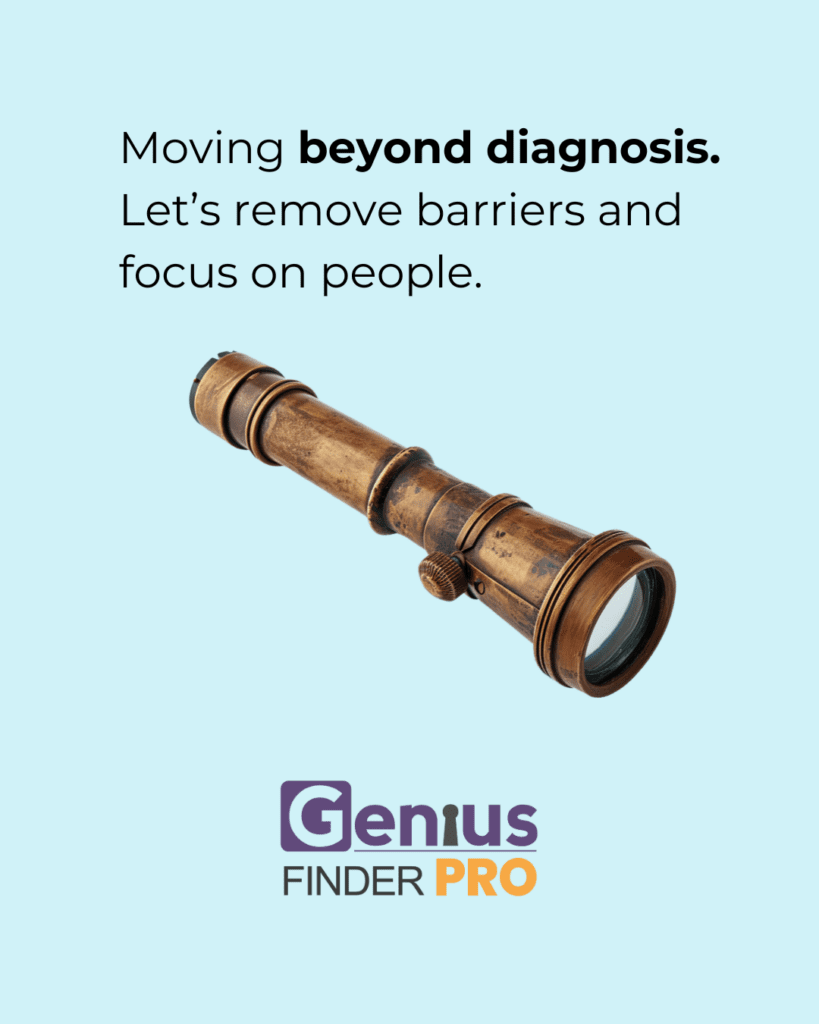Posted 19 May 2025
Beyond Neurodivergent Diagnosis: Let’s Remove Barriers and Focus on People
By Helen Doyle, Genius Within C.I.C.
First published: May 2025
Diagnosis can be a complicated subject for neurodivergent people.
Many of us are proud of our hard-won neurodivergent identity and want to normalise and de-stigmatise sharing these details about ourselves. That pride is powerful and it can be transformative.
And we certainly don’t want to go back to the era of worrying about “labeling” people, which left so many without the words, frameworks, or answers they needed to understand themselves.
But when it comes to employment support, strategy coaching, and human resources, it can be seriously detrimental to place too much emphasis on diagnosis.

No More Gatekeeping.
At Genius Within C.I.C., we’ve supported thousands of people in the workplace, and if there’s one thing we’ve learned, it’s this: diagnosis should never be a gatekeeper to getting support.
The reality is, not everyone has access to a diagnosis. Waiting lists are long, private assessments are expensive, and some people are misdiagnosed or underdiagnosed, especially women, black and brown people, and those who mask.
And for those who do have a diagnosis, many don’t feel safe or comfortable disclosing it at work. That’s completely understandable, and entirely valid. A diagnosis can be helpful, yes, but it shouldn’t be the only path to receiving tools, understanding, or reasonable adjustments.
Context is King
Let’s be real: neurodivergent people already face more than enough barriers in work and life.
We don’t need another one in the form of “prove it before we support you.” Everyone needs performance support at some point, whether you’re Autistic, ADHD, dyslexic, or none of the above.
In our coaching practice people often come to us not just because of their neurotype, but because something else, could even be something temporary, is affecting their performance.
A role change might require them to develop new skills that aren’t in their comfort zone. An Illness or events in their personal life may have lowered their energy and resilience. A location change could have introduced new sensory challenges. None of these things require a diagnosis to be valid or understood. What matters is knowing the context and the person.
For example, someone could be telling us that they are struggling to focus on a complex task because of background noise. This could very well be exacerbated by being neurodivergent, but it also might not. We can solve the problem either way!
Even within the brackets of a specific neurotype, no two people are the same. We all think, learn, and work differently, and we all have different things going on in our lives that may be affecting us. Boiling everything down to diagnosis is overly simplistic and often unhelpful.
When we focus on individual strengths, challenges, and needs, we build workplaces that are fairer, kinder, and more genuinely inclusive for everyone.
Support beyond diagnosis: Genius Finder™
Being able to take ownership and control of your own support can be valuable for many of us. That’s part of the reason why Genius Within developed Genius Finder™.
Unlike some of the other psychometric platforms out there, the Genius Finder™ is built to go straight to what actually matters: how someone works, what they’re great at, what they find tricky, and how confident they feel in their role. No diagnosis needed.
It gives people a language to talk about their needs without first having to justify them through a medical, pathologising lens. It’s practical, affirming, and designed to create real, actionable change, not just tick boxes or meet compliance.
